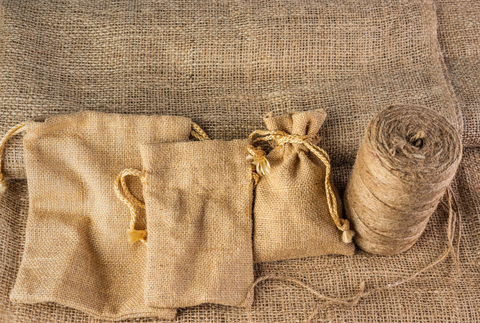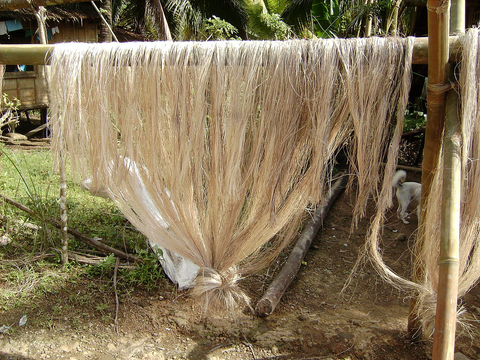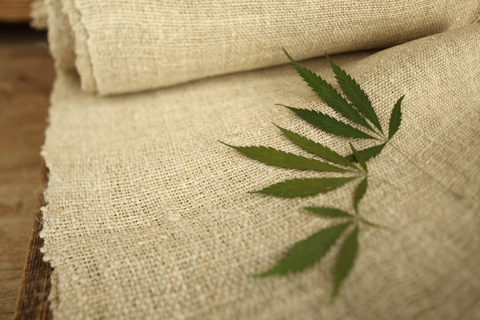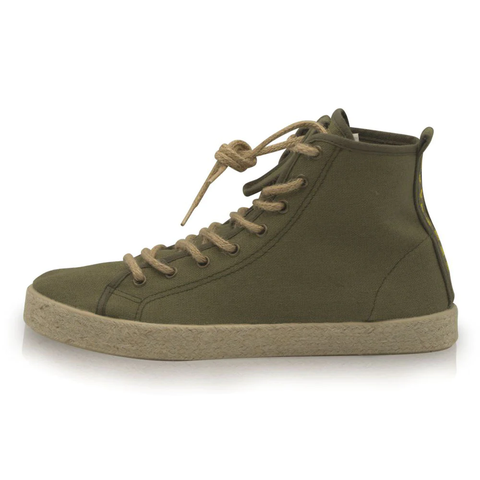In the quest for sustainable and eco-friendly materials, two contenders emerge from the natural fiber realm: Jute and Hemp. Imagine a showdown where these fibers compete for the title of the ultimate eco-friendly champion.
On one hand, we have hemp, known for its versatile applications and robust qualities. On the other hand, jute steps into the ring with its rich history and widespread use in various industries. As we delve into this clash of fibers, we'll explore their defining characteristics, from strength and durability to fire and pest resistance.
Join us as we navigate through the intricacies of Jute vs. Hemp, unraveling their unique features like never before. From their properties to their applications in footwear and beyond, we'll dissect the differences and similarities between these two natural wonders.
So, buckle up as we embark on an exploration of Jute and Hemp, determining which fiber reigns supreme in the realm of eco-friendliness!
What is Hemp?
Originating from Central Asia, industrial Hemp, scientifically termed Cannabis sativa, boasts a long fiber renowned for its exceptional durability.
Unlike many fibers, it typically undergoes minimal chemical treatment or bleaching, preserving its natural hues ranging from yellow to green, brown, or gray. This inherent strength renders it ideal for crafting various cords such as yarn, twine, string, and rope, all prized for their robustness.
Furthermore, these super fibers extend their utility into the textile industry, where they contribute to eco-friendly apparel and footwear. With a focus on sustainability and biodegradability, coupled with advancements in technology, the versatility of Hemp continues to expand, paving the way for innovative applications across multiple sectors.
Learn more about Hemp shoes!
What is Jute?

Jute, scientifically known as "Corchorus", is a versatile natural fiber sourced from the bark of the Jute plant, a member of the Tiliaceae family. Renowned as "golden fiber" due to its color and cost-effectiveness.
Its fibers are characterized by their length, luster, and softness which exhibit remarkable strength. These fibers are meticulously spun into robust threads, ranging in color from off-white to deep brown, with lengths spanning from 3 to 12 feet.
Often referred to as burlap in its raw form, Jute finds extensive utility in crafting fabric bags and sacks for packaging commodities like coffee, rice, potatoes, or beans. Additionally, it adorns the realms of home decor and craft items, showcasing its adaptability and eco-friendly appeal in diverse applications.
Jute vs. Hemp: Key Features
In addition to having amazing properties, both fibers are excellent alternatives to synthetic materials. Here are some of the main advantages of both fibers -
1) Strength
Both Hemp and Jute are renowned for their exceptional strength in comparison to other materials available today. However, Hemp edges are out in this aspect.
With an average tensile strength of 250 MPa (one MPa equals one million pascals), industrial hemp surpasses jute, which stands at 200 MPa. This disparity in strength makes hemp the preferred choice for manufacturing robust building materials and sturdier products that demand solidity and firmness.
Consequently, hemp's superior strength attributes contribute to widespread use in various industries seeking reliable and durable materials for construction and production purposes.
2) Durability
Hemp stands out for its remarkable durability, making it an ideal choice for crafting ropes, cords, and canvasses renowned for their longevity. Conversely, Jute's comparative lack of strength and durability renders it more susceptible to degradation over time, limiting its potential applications in long-lasting products.
3) Fire Resistance
Hemp's inherent fire resistance makes it ideal for crafting decorative ropes used in home decor, ensuring safety and durability. Conversely, Jute lacks this fireproof quality, prompting a preference for Cannabis sativa plant fiber in applications where fire resistance is paramount, highlighting Hemp's superiority in such scenarios.
4) Pest Resistance

Industrial hemp boasts superior pest resistance compared to jute, making it a preferred choice for various applications. Its resilience against pests and insects surpasses that of jute, ensuring minimal damage or deterioration to its fibers even when exposed to pathogens or diseases.
This inherent quality makes hemp ideal for crafting products like sacks or canvas fabric, where protection against pests is paramount. Therefore, in scenarios where susceptibility to pests is a concern, opting for Hemp over Jute proves to be a prudent choice, ensuring durability and longevity in various industrial and commercial settings.
Know more about Hemp shoes with FAQs!
5) Flexibility and Elasticity
With its remarkable pest resistance, industrial Hemp stands out as a top choice across various applications. Its robust ability to withstand pests and insects surpasses that of Jute, ensuring minimal fiber damage even when faced with pathogens or diseases.
This inherent quality makes hemp particularly suitable for crafting products like sacks or canvas fabric, where protection against pests is crucial. Thus, in contexts where pest susceptibility is a significant consideration, opting for Hemp over Jute emerges as a wise decision, guaranteeing durability and longevity in diverse industrial and commercial environments.
6) Shape Retention Characteristics

When seeking a material with enduring shape retention and longevity, industrial Hemp surpasses Jute. Its resilience ensures products like upholstery, clothing, or DIY crafts maintain their form over years of use. Opt for Hemp for durability and reliability in crafting long-lasting, high-quality items.
7) Hypoallergenic and Antibacterial Properties
Industrial Hemp presents a compelling advantage over Jute due to its resistance to mold, mildew, and fungus growth, ensuring allergen-free usage suitable for individuals with sensitive skin or allergy concerns.
Conversely, Jute's susceptibility to mold and mildew poses challenges, rendering it less suitable for products in direct contact with skin. While Hemp's hypoallergenic and antibacterial properties offer enhanced safety and durability, caution is advised when considering Jute for applications where skin contact is prevalent, highlighting the superior suitability of industrial Hemp for various eco-friendly and skin-friendly products.
8) Thermal Insulation
Industrial Hemp, distinguished by its hollow fibers, emerges as a remarkable natural insulator, excelling in preserving warmth during cooler weather. Its exceptional thermal conductivity positions it as a leading choice for residential and commercial construction, enhancing energy efficiency.
In contrast, jute, lacking similar thermal conductivity, falls short as a viable option for home insulation. Thus, hemp stands out as a superior choice for natural insulation due to its ability to retain heat effectively, Jute's limitations in this aspect render it less suitable for such applications.
9) Moisture Retention
Hemp's superior absorption capabilities make it ideal for moist or wet environments, such as in canvas, sacks, and garden or craft ropes. Conversely, Jute is not recommended for such conditions due to its susceptibility to damage and faster thread weakening when exposed to moisture.
10) The Cost
Due to its lower durability and versatility compared to other fibers, such as Hemp, Jute often comes at a more economical price point. Its widespread availability further contributes to its affordability, making it a cost-effective solution across a myriad of applications in various industries.
Jute vs. Hemp Shoes: Difference

When comparing Jute vs. Hemp shoes, several key differences emerge that can influence consumer choice.
Jute shoes are typically lightweight and known for their natural, eco-friendly appeal. They often feature a casual and breathable design, making them suitable for warm weather and casual occasions. However, Jute shoes may lack the durability and water resistance needed in more rugged environments or prolonged wear.
On the other hand, Hemp shoes for women offer a balance of durability, comfort, and sustainability. Hemp fibers are known for their strength and resistance to wear and tear, making Hemp shoes suitable for various outdoor activities and everyday wear.
Additionally, Hemp shoes often boast moisture-wicking properties and can withstand exposure to moisture better than Jute shoes. Overall, the choice between Jute and Hemp shoes depends on individual preferences regarding style, durability, and intended use.
Hemp vs. Jute Plants
Jute and Hemp, though often confused, are distinct plants with unique characteristics. Jute, derived from plants in the genus Corchorus, is primarily cultivated for its bast fibers, which are extracted from the inner flesh of the plant.
These fibers are then spun into materials like burlap, hessian, and gunny cloth, finding applications in packaging, textiles, and constructions. On the other hand, Hemp comes from the Cannabis sativa species and shares the bast fiber composition with Jute, harvested similarly from the plant's inner stem.
However, Hemp boasts a wider array of uses, ranging from textiles like Hemp fabric to versatile products such as animal feed, eco-friendly concrete, and biodegradable plastics. While both Jute and Hemp offer eco-friendly alternatives, their specific properties and applications cater to diverse industries and needs, making them invaluable resources in the pursuit of sustainability.
Similarities Between Hemp and Jute Fibers
The similarities between Hemp and Jute fibers are remarkable, showcasing the versatility and utility of these natural materials. Both Hemp and Jute fibers are derived from plants, making them biodegradable and environmentally friendly options for various applications.
In terms of strength, both fibers exhibit commendable durability, making them suitable for use in textiles, ropes, and other products requiring robust materials. Additionally, both Hemp and Jute fibers possess excellent moisture absorption properties, which contribute to their effectiveness in outdoor and wet environments.
Furthermore, these fibers share hypoallergenic qualities, making them suitable for individuals with sensitive skin or allergies. Their natural origin also lends them antibacterial and antimicrobial features, enhancing their suitability for hygiene-related products.
Overall, the similarities between Hemp and Jute fibers underscore their status as sustainable, versatile, and reliable materials with a wide range of applications across industries.
Check out our exclusive collection of men’s hemp shoes.
Why Is Hemp Rope a Better Option Than Jute?

When it comes to selecting the ideal rope for various applications, the choice between Hemp and Jute can significantly impact performance and longevity.
While both plants offer versatility in cordage and rope-making for landscaping, gardening, food preparation, and outdoor activities, Hemp stands out as the premier option for those seeking unparalleled strength and durability.
Hemp rope gives exceptional moisture absorbance and UV resistance, making it a top choice for outdoor and wet environments where Jute might falter. Unlike Jute, Hemp rope maintains its shape and appearance even when wet, ensuring longevity and reliability in various conditions.
The benefits of opting for Hemp rope over Jute are multifaceted: from its superior strength, shape, and color retention to its hypoallergenic, antibacterial, and antimicrobial properties. Additionally, Hemp rope offers resistance to abrasion and piling, effectively blocks harmful UV rays, regulates temperature, and remains mold and mildew-resistant.
Furthermore, choosing Hemp aligns with sustainability efforts, as it is biodegradable, making it an environmentally conscious choice for eco-friendly consumers.
Summary of Hemp vs. Jute!
In the grand arena of eco-friendly fibers, the battle between Jute and Hemp fibers has been nothing short of illuminating. As we've explored their key features, compared their strengths and weaknesses, and delved into their myriad applications, one question has lingered: which fiber truly reigns supreme in the realm of sustainability and versatility?
While both Hemp and Jute have their unique merits, it's clear that Hemp emerges as the frontrunner in this eco-friendly showdown. With its exceptional strength, durability, and resistance to various elements, Hemp proves itself as a reliable and robust choice for a wide array of products and industries.
Moreover, its superior qualities, including hypoallergenic and antibacterial properties, thermal insulation, and moisture retention, further solidify its position as the eco-conscious consumer's top pick.
So, as we conclude this exploration of Jute vs. Hemp, let us crown hemp as the undisputed champion, leading the charge toward a greener, more sustainable future.
Get in touch with FootHemp today to find out more, or check out the store and buy your first pair!

